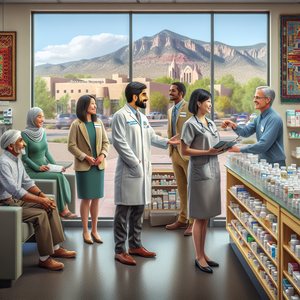
Unveiling the Spectrum of Pharmacy Careers: A Deep Dive into Roles, Responsibilities, and Opportunities
The pharmacy profession is a multifaceted realm that offers an impressive variety of career paths for those eager to make a significant impact on healthcare. With specializations ranging from community and clinical pharmacy to industrial roles, aspiring pharmacists have the opportunity to select a pathway that resonates with their interests and strengths.
Job Summaries:
Community Pharmacist:
- Community pharmacists are often the first point of contact for patients within retail settings.
- They fill prescriptions, counsel patients on medication usage, conduct health screenings, and promote medication adherence, significantly impacting public health.
- A Doctor of Pharmacy (PharmD) degree and state licensure are essential for this role.
Clinical Pharmacist:
- In hospital and clinic environments, clinical pharmacists collaborate with healthcare teams to enhance patient care.
- Their responsibilities include medication therapy management and reviewing patient medication regimens to provide recommendations to physicians.
- A PharmD and completion of a clinical pharmacy residency are typically required.
Consultant Pharmacist:
- Consultant pharmacists work closely with healthcare facilities, particularly nursing homes, to conduct medication reviews and create management plans.
- Their focus on regulatory compliance and safety for vulnerable populations is crucial.
- This role requires a PharmD and relevant certifications.
Hospital Pharmacist:
- Hospital pharmacists play a vital role within multidisciplinary healthcare teams by managing medication distribution and offering clinical support.
- They actively participate in patient care rounds, influencing treatment decisions.
- A PharmD and a residency in hospital pharmacy are necessary qualifications.
Pharmaceutical Industry Pharmacist:
- Pharmacists in the pharmaceutical industry contribute to drug development, regulatory affairs, and marketing.
- They ensure that products are both safe and effective.
- Typically, a PharmD or an advanced degree in pharmaceutical sciences is required for this critical role.
Nuclear Pharmacist:
- Nuclear pharmacists specialize in preparing and dispensing radiopharmaceuticals used for diagnostic imaging and therapy.
- They adhere to strict safety guidelines and provide essential guidance on handling radioactive materials.
- A PharmD and specialized training in nuclear pharmacy are prerequisites.
Ambulatory Care Pharmacist:
- Focusing on chronic disease management
- Ambulatory care pharmacists conduct medication therapy management
- Health screenings in outpatient settings
- A PharmD and residency in ambulatory care are often necessary
Compounding Pharmacist:
- Compounding pharmacists create customized medications tailored to individual patient needs.
- They operate under rigorous regulatory standards.
- A PharmD and relevant compounding experience are essential.
Geriatric Pharmacist:
- Geriatric pharmacists focus on the medication needs of elderly patients.
- Ensuring safe management of multiple medications.
- They typically work in hospitals and long-term care facilities.
- Requiring a PharmD and specialized geriatric training.
Research Pharmacist:
- Research pharmacists are involved in clinical trials and drug development.
- They ensure compliance with regulatory standards.
- This role generally requires a PharmD.
- Experience in clinical research is also required.
Pediatric Pharmacist:
- Pediatric pharmacists specialize in addressing the medication needs of children.
- They collaborate closely with pediatricians to ensure safe treatment options.
- A PharmD and specialized training in pediatrics are often necessary.
Critical Care Pharmacist:
- Critical care pharmacists work in intensive care units (ICUs)
- Provide specialized medication management for critically ill patients
- Expertise in pharmacotherapy is vital for improving patient outcomes in urgent situations
Academia Pharmacist:
- Academia pharmacists engage in teaching pharmacy students and conducting research at educational institutions.
- They develop curricula and mentor future pharmacy professionals.
- A PharmD and an advanced degree (PhD) in a related field are necessary for this path.
Pharmacy Technician:
- Pharmacy technicians assist pharmacists in medication preparation and customer service within retail or hospital settings.
- Typically, a high school diploma and on-the-job training are sufficient for this role.
Pharmacy Manager:
- Pharmacy managers oversee all pharmacy operations
- Managing staff, budgets, and ensuring regulatory compliance
- A PharmD and prior experience in pharmacy operations are necessary for this leadership position.
Military Pharmacist:
- Military pharmacists provide care to active-duty service members and veterans
- Focus on medication management and health promotion within various military contexts
- A PharmD and relevant military training are essential
Oncologist Pharmacist:
- Oncologist pharmacists specialize in managing medications for cancer patients.
- They work in tandem with oncologists to optimize treatment regimens.
- They help manage side effects of cancer treatments.
- A PharmD and specialized oncology training are required.
Health-System Pharmacist:
- Health-system pharmacists operate across multiple healthcare facilities.
- Managing medication use.
- Collaborating on formulary development.
- A PharmD and experience in health-system pharmacy are typically required.
Toxicology Pharmacist:
- Toxicology pharmacists specialize in managing poisonings and overdoses.
- They provide expert consultation during medical emergencies.
- They work in hospitals and poison control centers.
- Often requiring a PharmD and specialized toxicology training.
Wholesale Pharmacist:
- Wholesale pharmacists oversee the distribution of pharmaceuticals.
- Ensuring compliance with regulations while managing inventory.
- A PharmD and experience in pharmaceutical distribution are generally required.
The diverse career opportunities within pharmacy underscore the essential roles pharmacists play in enhancing patient care and safety. Given the increasing demand for pharmacists in various settings, the career outlook remains robust, with numerous paths available for those aspiring to make a difference in healthcare.
Explore More Jobs

